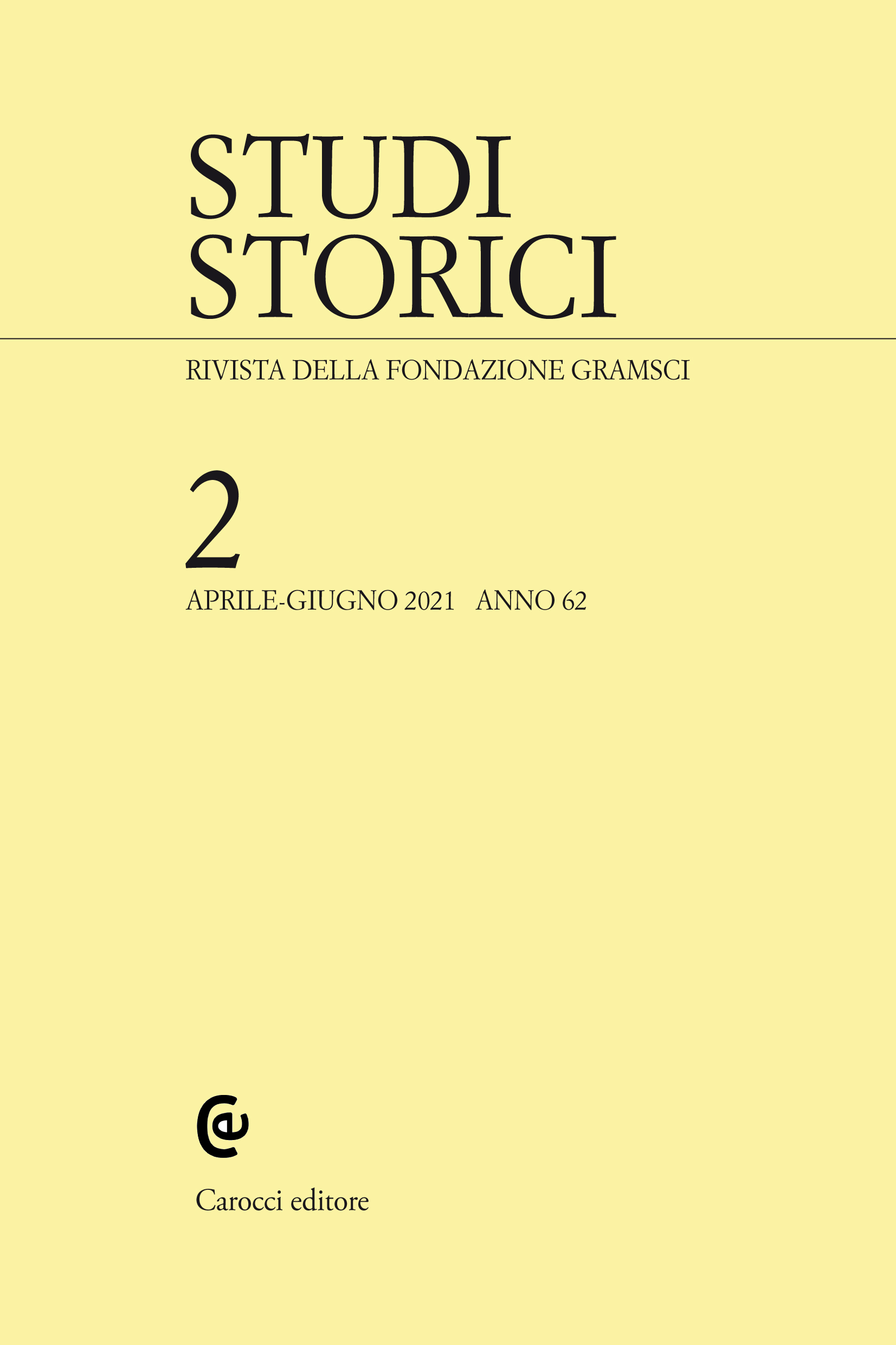
aprile - giugno 2021 anno 62
Sommario e abstract degli articoli
Mario Liverani, pp. 361-377
ORIENTI E OCCIDENTI
Easts and Wests
Starting from the volume of Santo Mazzarino Between East and West (published in 1948, new edition 1989), the essay takes its inspiration from the cultural identity of archaic Greece. Between the eighth and sixth centuries BC, Greek culture was founded, and with it the West. As for the internal division of the East, compared to that between a micro-Asian area and a Mesopotamian-Persian one, the division between a Mediterranean-influenced East (the «Levant») and a «deep», Mesopotamian and Iranian, East appears more appropriate. A common element in the Levant between the end of the Bronze Age and the rise of the Persian Empire, was the city-state; it was then the turn of the sixth century to characterize the Greek polis. Historicizing Greece and the West therefore requires a similar process for the East as well, and to this end Mazzarino’s studies still offer an important contribution.
Keywords: Santo Mazzarino, East, West, Archaic Greece, City-State.
Parole chiave: Santo Mazzarino, Oriente, Occidente, Grecia arcaica, Città-Stato.
Pierluigi Ciocca, pp. 379-398
L’ECONOMIA EUROPEA: OTTO SECOLI + 2
The European Economy: Eight Centuries + 2
Starting in the year 1000 and approximately for the eight centuries thereafter, many things changed in Western Europe, especially in labour relationships: slavery, serfdom, the domestic system, and the wage system. Nonetheless, productivity and personal income did not improve. The contrast between this Malthusian picture and the productive explosion of the last two centuries is striking. It cannot be reconciled with the main interpretations of history: the Hicksian «rise of the market» or the Marxian «mercantile capitalism.» Understanding the new mode of production which through the British Industrial Revolution prevailed in Europe and worldwide requires a specific approach that starts from a clear distinction between the historical phases that preceded and followed 1800. Technical progress and capital accumulation gave the new system an extraordinary growth potential. At the same time, the system is inherently unstable, profoundly unequal, and its externalities exacerbate the environmental problem. This is the basic contradiction that threatens the system and its democratic forms.
Keywords: Fixed capital, Innovation, Pay and profit, Instability, Inequality.
Parole chiave: Capitale fisso, Innovazione, Salari e profitti, Instabilità, diseguaglianza.
Margherita Losacco, pp. 399-436
NUOVE PAGINE AUTOBIOGRAFICHE DI EMILIO SERENI
New Autobiographical Pages by Emilio Sereni
A typescript containing Emilio Sereni’s autobiography, from his birth to April 1946, is preserved among his papers at the Gramsci Foundation in Rome. It was meant to be printed – and actually was, though in shorter form – in the Dirigenti comunisti series. The collection, scarcely known thus far, comprised the lives of 22 party executives, and was released during the June 1946 election campaign. This article contains the transcription of Sereni’s typescript. It also considers what Sereni had chosen to understate (e.g. his family’s Jewish origins and background), to omit (e.g. his early interest related in the Zionistic movement), and to emphasize (his devotion to Italy’s Southern question and related issues). It also shows the editorial interventions on Sereni’s text and their political and cultural background.
Keywords: Emilio Sereni, Italian Communist Party, Autobiography, Fondazione Gramsci Archives.
Parole chiave: Emilio Sereni, Partito comunista italiano, Autobiografia, Archivio della Fondazione Gramsci.
Ricerche
Enza Russo, pp. 437-462
IL CONTROLLO DEL TESORO NELLA PRASSI AMMINISTRATIVA DELLA CORONA D’ARAGONA: LO STILUM OFFICII MAGISTRI RACIONALIIS NELLA PRIMA METÀ DEL QUATTROCENTO
The Control of the Treasury according to the Crown of Aragon’s Administrative Practice: the Stilum Officii Magistri Racionaliis during the First Half of the Fifteenth Century
Over the course of the fourteenth century, the office of the mestre racional (accounting master) – the main accounting office of the Crown of Aragon – experienced a significant development, resulting in the establishment of clear rules about its operation, as described in the ordinances of Peter IV of Aragon (1336-87), called the “Ceremonious.” This paper analyses the accounting practice of the royal treasury (the so-called tesorería general) under Alfonso the Magnanimous (1416-58), suggesting that this office operated in continuity with Peter the Ceremonious’s stilum curie, to the extent that, during his reign, King Alfonso directly referred to the fourteenth-century regulation on several occasions.
Keywords: Middle Ages, 15th Century, Crown of Aragon, Alfonso the Magnanimous, Accounting.
Parole chiave: Medioevo, Secolo XV, Corona d’Aragona, Alfonso il Magnanimo, Contabilità.
Simona Berhe, pp. 463-493
L’UNIFORME E IL BARRACANO: TRUPPE COLONIALI E BANDE IRREGOLARI IN LIBIA OCCIDENTALE
The Uniform and the Burnous: Colonial Troops and Irregular Units in Western Libya
The essay analyses the different strategies adopted by Italy to solve the problem of military recruitment in Western Libya. The solutions adopted by Italy were twofold: the creation of irregular units, namely armed groups recruited locally and led by Tripolitanian notables; the other solution was the enlistment of individuals in the colonial army. In addition to the recruitment strategies, the essay examines the issue of military justice through the review of the sentences issued by the war courts of Tripoli.
Keywords: Libya, Colonial troops, Military justice, Recruitment, Irregular units.
Parole chiave: Libia, Truppe coloniali, Giustizia militare, Reclutamento, Bande irregolari.
Alessandro Della Casa, pp. 495-524
VOLT FUTURISTA. VINCENZO FANI CIOTTI NEL «PERIODO EROICO» DELL’AVANGUARDIA DI FILIPPO TOMMASO MARINETTI
Volt the Futurist. Vincenzo Fani Ciotti during the ‘Heroic Period’ of F.T. Marinetti’s Avant-garde
Object of interest to scholars of Futurism and fascism, the short yet eclectic and prolific life of Count Vincenzo Fani Ciotti (1888-1927) – better known as Volt – has often been reduced to the oxymoron of “reactionary Futurism” as he, in his later years, was to call his own synthesis between Futurist technical modernization and the demands of the traditionalist, monarchist and Catholic “fascist right.” By analyzing Volt’s writings during Futurist “heroic period” and his unpublished papers, the article aims to highlight the distinctive features of Volt’s artistic and literary production and the (not seldom progressive) political-ideological messages he tried to convey through it, before he adhered to fascism.
Keywords: Volt, Futurism, Literature, Architecture, Political thought.
Parole chiave: Volt, Futurismo, Letteratura, Architettura, Pensiero politico.
Opinioni e Dibattiti
Pasquale Palmieri, pp. 525-545
GIUSTIZIA E SPAZIO PUBBLICO NEL SETTECENTO. DALLA FORZA DELL’EMPATIA AL MERCATO DELLE EMOZIONI
Justice and Public Space in the Eighteenth Century. From the Power of Empathy to the Market of Emotions
Recent historiography has shown how eighteenth-century popular narratives about famous trials had a significant impact on people’s lives and political engagements, by appealing to their faculties both of reason and emotion. Rather, the theatre of the courtroom became all the more conspicuously mediated by competing modes of communication throughout Europe. These modes of communication thrust the public into a new socio-political reality in which the repressive apparatus of the State produced controversial outcomes, and criminals’ guilt and innocence was now open for debate. Scholars therefore always need to bear in mind that the media shaped perceptions about criminal actions and behaviours in terms of literary conventions, whether those perceptions originally derived from established powers, cultural industries and sociable spaces, or the participatory impulses of the public.
Keywords: Justice, Public sphere/space, Media, Emotions, Popular culture.
Parole chiave: Giustizia, Spazio/Sfera pubblica, Mezzi di comunicazione, Emozioni, Cultura popolare.
Note critiche
Niccolò Guasti, pp. 547-565
INTELLETTUALI E POTERE NELLA SPAGNA DELLA ILUSTRACIÓN
Intellectuals and Power in the Spain of Ilustración
This article reflects on the book by Antonio Mestre Sanchis, Religiosidad, cultura y política. Mayans y la Companía. De la amistad a la ruptura, Valencia, Facultad de Teologia San Vicente Ferrer, 2019..
Keywords: Society of Jesus, Enlightenment, 18th century Reform, Spain.
Parole chiave: Compagnia di Gesù, Illuminismo, Età delle riforme, Spagna.
Sfoglia gli altri numeri dell’anno 62 / 2021
Elenco dei fascicoli pubblicati dal 2010
Seleziona fascicolo...
- anno 65 / 2024
- 1
- anno 64 / 2023
- 1
- 2
- 3
- 4
- anno 63 / 2022
- 1
- 2
- 3
- 4
- anno 62 / 2021
- 1
- 2
- 3
- 4
- anno 61 / 2020
- 1
- 2
- 3
- 4
- anno 60 / 2019
- 1
- 2
- 3
- 4
- anno 59 / 2018
- 1
- 2
- 3
- 4
- anno 58 / 2017
- 1
- 2
- 3
- 4
- anno 57 / 2016
- 1
- 2
- 3
- 4
- anno 56 / 2015
- 1
- 2
- 3
- 4
- anno 55 / 2014
- 1
- 2
- 3
- 4
- anno 54 / 2013
- 1
- 2
- 3
- 4
- anno 53 / 2012
- 1
- 2
- 3
- 4
- anno 52 / 2011
- 1
- 2
- 3
- 4
- anno 51 / 2010
- 1
- 2
- 3
- 4
